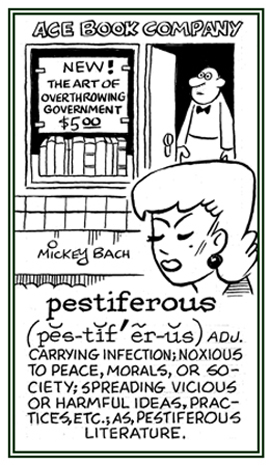pesti-, pest- +
(Latin: plague, contagion)
nonpersistent pesticide, soft pesticide
A pesticide compound that is rapidly biodegradable with a half life of a few days.
persistent pesticide, hard pesticide
A pesticide compound that remains in the environment for relatively long periods.
The extent of its persistence depends on several factors; such as, the tkype of soil, iots moisture, temperature, and pH, and the extent of cultivation and cover crops.
pest
1. Plague; pestilence.
2. Any harmful or annoying organism; especially, an infestive animal; such as, chicken pest and fowl pest, now known as "avian influenza".
2. Any harmful or annoying organism; especially, an infestive animal; such as, chicken pest and fowl pest, now known as "avian influenza".
pest resurgence
The rapid numerical rebound of a pest population after use of a broad-spectrum pesticide, brought about usually by the destruction of natural enemies that were otherwise holding the pest in check.
pesthouse
1. A house, or hospital, for people who are infected with any pestilential disease (tending to produce a pestilence or a disease known as the plague; hence, any contagious or infectious epidemic disease).
2. Formerly a hospital where people suffering from infectious diseases were once confined and sometimes treated.
2. Formerly a hospital where people suffering from infectious diseases were once confined and sometimes treated.
The term pest was once synonymous with the plague and more generally referred to any dread contagious disease.
pesticemia
The presence of plague organisms in the blood.
pesticide residue
The amount of any pesticide remaining on or in food or beverages intended for human consumption.
pesticide, pesticidal
A substance for destroying pests; especially, insects.
pestiferous (adjective), more pestiferous, most pestiferous
1. A reference to something which produces, breeds, or harbors infectious diseases: The sewers, which were blocked and causing flooding, were declared pestiferous zones by the health department.
2. Characteristic of something or a place being contaminated by an epidemic ailment: Dr. Moralas worked in the pestiferous ward in the temporary hospital of the desert community.
3. Descriptive of a person who is morally evil or deadly: Slane was known to the police as a pestiferous person who hung around dark corners of the local streets waiting for an opportunity to rob someone.
4. Pertaining to an individual who is bothersome or annoying: Keith's younger brother was the most pestiferous kid in the neighborhood because he was always teasing younger children and girls.
5. Etymology: from Latin pestiferus; from pestis, "plague" + ferre, "to bear".

© ALL rights are reserved.
Go to this Word A Day Revisited Index
2. Characteristic of something or a place being contaminated by an epidemic ailment: Dr. Moralas worked in the pestiferous ward in the temporary hospital of the desert community.
3. Descriptive of a person who is morally evil or deadly: Slane was known to the police as a pestiferous person who hung around dark corners of the local streets waiting for an opportunity to rob someone.
4. Pertaining to an individual who is bothersome or annoying: Keith's younger brother was the most pestiferous kid in the neighborhood because he was always teasing younger children and girls.
5. Etymology: from Latin pestiferus; from pestis, "plague" + ferre, "to bear".

Go to this Word A Day Revisited Index
so you can see more of Mickey Bach's cartoons.
pestiferously (adverb), more pestiferously, most pestiferously
1. A reference to the spread and cause of an epidemic disease: Recently, measles spread at a pestiferously fast rate through the local school.
2. Characterized by the contamination of infecting organisms: The health inspectors, including Mr. Gould and Mrs. Roberts, were concerned about the potentially pestiferously dangerous contamination of the meat when the refrigerators in the grocery store did not work properly.
2. Characterized by the contamination of infecting organisms: The health inspectors, including Mr. Gould and Mrs. Roberts, were concerned about the potentially pestiferously dangerous contamination of the meat when the refrigerators in the grocery store did not work properly.
A particularly fatal epidemic disease; especially, in the past with the bubonic plague: For a report in school, Jane found out that International health organizations are concerned about the pestiferousness of Ebola virus, which is largely limited to parts of Africa; at least for now.
pestilence
1. A usually fatal epidemic disease; especially, bubonic plague.
2. A pernicious, evil influence, or agent.
2. A pernicious, evil influence, or agent.
pestilential
Relating to or tending to produce a pestilence (disease known as the plague; hence, any contagious or infectious epidemic disease that is virulent and devastating).
pestis bubonica
The most common form of the plague in humans; characterized by chills, prostration, delirium and the formation of buboes in the armpits and groin; synonym: "bubonic plague".
pestis fulminans
Any severe and often rapidly fatal form of plague.
Showing page 1 out of 2 pages of 18 main-word entries or main-word-entry groups.

